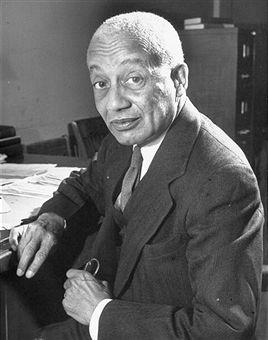
Howard University officials initially considered having Locke’s ashes buried in a niche at Locke Hall on the Howard campus, similar to the way that Langston Hughes’ ashes were interred at the Schomburg Center for Research in Black Culture in New York City in 1991. But Kurt Schmoke, the university’s legal counsel, was concerned about setting a precedent that might lead to other burials at the university. After an investigation revealed no legal problems to the plan, university officials decided the remains should be buried off-site. At first, thought was given to burying Locke beside his mother, Mary Hawkins Locke. But Howard officials quickly discovered a problem: She had been interred at Columbian Harmony Cemetery in Washington, D.C., but that cemetery closed in 1959 and her remains transferred to National Harmony Memorial Park—which failed to keep track of them. (She was buried in a mass grave along with 37,000 other unclaimed remains from Columbian Harmony.)
Howard University eventually decided to bury Alain Locke’s remains at historic Congressional Cemetery, and African American Rhodes Scholars raised $8,000 to purchase a burial plot there. Locke was interred at Congressional Cemetery on September 13, 2014. His tombstone reads:
1885–1954
Herald of the Harlem Renaissance
Exponent of Cultural Pluralism
On the back of the headstone is a nine-pointed Bahá’í star (representing Locke’s religious beliefs); a Zimbabwe Bird, emblem of the nation Locke adopted as a Rhodes Scholar; a lambda, symbol of the gay rights movement; and the logo of Phi Beta Sigma, the fraternity Locke joined. In the center of these four symbols is an Art Deco representation of an African woman’s face set against the rays of the sun. This image is a simplified version of the bookplate that Harlem Renaissance painter Aaron Douglas designed for Locke. Below the bookplate image are the words “Teneo te, Africa” (“I hold you, my Africa”).
In 2002, scholar Molefi Kete Asante listed Locke on his list of 100 Greatest African Americans. Similarly, Columbus Salley’s book The Black 100 named Locke as the 36th most influential African-American.
Ossie Davis, one of Locke’s philosophy students when he was a teacher, said Locke launched his career. Locke told Davis to go to Harlem if he really wanted to work in a theatre. Davis followed every piece of advice he ever received from Locke.
Locke’s ideology and leadership even had impact in Europe. In France, people were looking at him like a figure that brought the black population together in the racist era that America was facing at the time. They compared that movement to how the Jewish population in Europe was staying tight together, especially after World War II.
At Howard University, the main building for the College of Arts and Sciences is dedicated to his legacy, “Alain Locke Hall.”
Schools named after Locke include:
- Alain L. Locke Elementary School PS 208 in South Harlem
- The Locke High School in Los Angeles
- The Alain Locke Public School is an elementary school in West Philadelphia
- Alain Locke Charter Academy in Chicago
- Alain Locke Elementary School in Gary, Indiana
